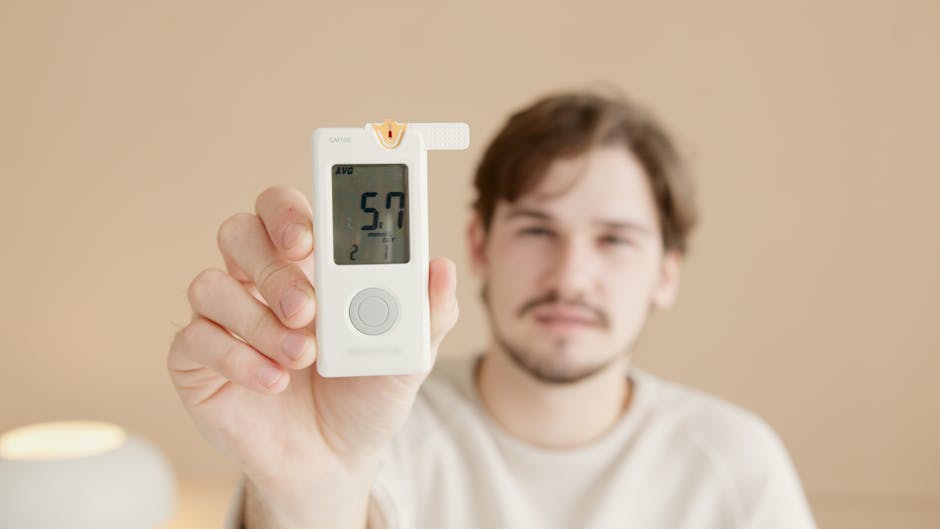5 Early Signs of Diabetes That Men Often Ignore
Diabetes is a chronic condition that affects millions worldwide, and its prevalence continues to rise. While awareness campaigns are widespread, many people, especially men, often overlook or dismiss the early warning signs. This oversight can lead to delayed diagnosis and potentially serious health complications down the line. Understanding the subtle cues your body might be sending is crucial for early intervention and effective management.

In this comprehensive guide, we’ll delve into 5 early signs of diabetes that men often ignore, explore why these symptoms are frequently dismissed, and emphasize the importance of listening to your body. Our goal is to empower you with the knowledge to recognize these critical indicators and seek timely medical advice, safeguarding your long-term health.
Why Men Often Overlook Diabetes Symptoms
It’s a common stereotype, but one with a grain of truth: men can sometimes be less proactive about their health. Several factors contribute to why men might ignore early diabetes symptoms:
- “Man Up” Mentality: There’s often a societal pressure for men to appear strong and resilient, leading them to downplay discomfort or pain.
- Attributing Symptoms to Aging: Many early diabetes signs, like fatigue or changes in urination, can easily be mistaken for normal aging processes.
- Busy Lifestyles: Work and family commitments can make it feel like there’s no time to visit a doctor for “minor” issues.
- Lack of Awareness: While diabetes is well-known, the specific early symptoms, especially how they manifest in men, might not be.
- Fear of Diagnosis: Sometimes, the fear of receiving a serious diagnosis can prevent men from seeking medical attention.
However, ignoring these early warning signs is a risky gamble. Diabetes, if left untreated, can lead to severe complications affecting the heart, kidneys, eyes, nerves, and even sexual health. Early detection is your best defense.
The 5 Early Signs of Diabetes Men Often Ignore
1. Excessive Thirst and Frequent Urination
This is perhaps one of the most classic and common early indicators of diabetes, yet it’s frequently brushed aside. If you find yourself drinking more water than usual and making more trips to the bathroom, especially at night, don’t ignore it.
Why it happens: When you have diabetes, your body either doesn’t produce enough insulin (Type 1) or can’t use insulin effectively (Type 2). Insulin is vital for moving glucose (sugar) from your bloodstream into your cells for energy. When glucose builds up in your blood, your kidneys work overtime to filter and absorb the excess sugar. When they can’t keep up, the excess sugar is excreted into your urine, taking fluids from your tissues with it. This leads to increased urination (polyuria) and, consequently, increased thirst (polydipsia).
Why men ignore it: “I’m just drinking more coffee,” “It’s hot outside,” or “I’m getting older, my bladder isn’t what it used to be.” These are common justifications. While these factors can play a role, a significant and persistent increase in thirst and urination warrants attention.
2. Unexplained Weight Loss
Losing weight without trying might sound like a dream for many, but when it happens unexpectedly and rapidly, it can be a red flag for diabetes.
Why it happens: Despite increased hunger (another potential symptom), individuals with uncontrolled diabetes can lose weight. This is because their cells aren’t getting the glucose they need for energy. The body then starts breaking down muscle and fat for fuel, leading to weight loss. This can be particularly noticeable in Type 1 diabetes but can also occur in Type 2.
Why men ignore it: “Finally, those extra pounds are coming off!” or “My metabolism must be speeding up.” While weight loss can be positive, unexplained weight loss – especially when accompanied by other symptoms like increased hunger or thirst – is not healthy and should be investigated.
3. Persistent Fatigue
Feeling tired is a part of modern life, but a deep, persistent fatigue that doesn’t improve with rest could be an early diabetes symptom.
Why it happens: If your body isn’t effectively converting glucose into energy due to insulin problems, your cells are essentially starving for fuel. This lack of energy can leave you feeling constantly exhausted, lethargic, and drained, even after a full night’s sleep. High blood sugar can also affect circulation, reducing oxygen and nutrient delivery to cells, further contributing to fatigue.
Why men ignore it: “I’m just stressed,” “I’m working too hard,” “I need more sleep.” While these might be true, consistent, debilitating fatigue that impacts your daily life should not be dismissed as normal.
4. Blurred Vision
Changes in eyesight can be alarming, but blurred vision associated with early diabetes is often intermittent and can be easily attributed to eye strain or simply “getting older.”
Why it happens: High blood sugar levels can affect the tiny blood vessels in your eyes, causing fluid to shift into and out of the lenses. This swelling can temporarily change the shape of your eye’s lens, leading to blurry vision. This blurring often fluctuates, improving when blood sugar levels stabilize and worsening when they are high.
Why men ignore it: “I need new glasses,” “I’ve been staring at a screen too long,” or “It’s just my eyes playing tricks on me.” While vision changes are common with age, sudden or fluctuating blurriness is a sign that needs medical evaluation, especially if other diabetes symptoms are present.
